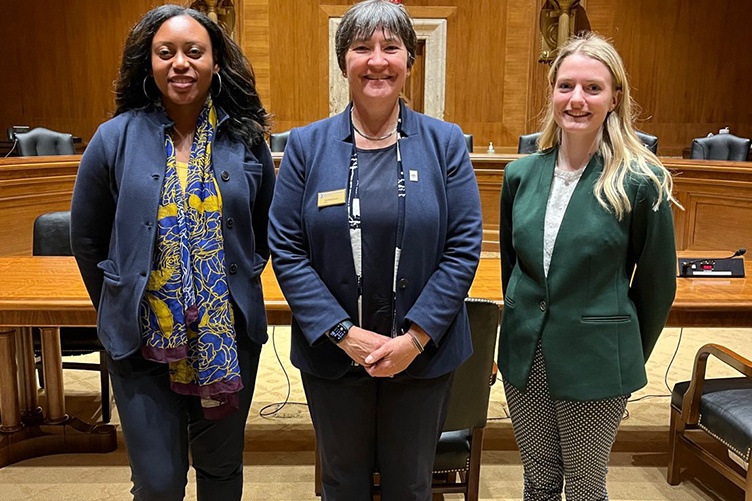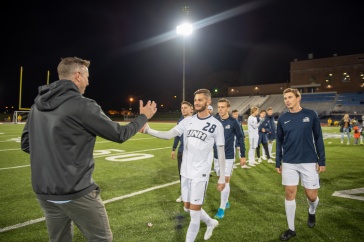
Cari Moorhead, dean of the UNH Graduate School (center) was joined by Ph.D. students Shantel Palacio (left) and Jo Field (right) for a trip to D.C. to advocate for graduate education.
In preparing for a visit to Washington, D.C. as part of the annual Council of Graduate Schools (CGS) Advocacy Day, Cari Moorhead, dean of the UNH Graduate School, was willing to allow for the fact that most of the people she’d be meeting with likely don’t think about graduate education in the same all-consuming way she does.
But she was looking forward to trying to change that.
Moorhead and two UNH Ph.D. students, Jo Field and Shantel Palacio, made the trek to the nation’s capital in late April for the CGS event to advocate for the importance of funding graduate education at the federal level, meeting with staffers on the hill to share their perspectives and make the case for prioritizing graduate education at the same level as K-12 or undergrad.
“It turns out, unlike me they aren’t thinking 24-7 about graduate education and how that work gets done,” Moorhead says. “But if you care about K-12 education, most of those teachers have graduate-level degrees, so those two things are not unconnected. So, we are helping to draw those lines. If you’re not thinking about the professional education that takes place at the graduate level, then we forget about the teachers and the nurses and the people that are getting that additional support in a wide array of areas.”
The visit featured the opportunity to interact with lawmakers on both sides of the aisle and for the UNH representatives and other CGS advocates to stress the importance of continuing – or, ideally, increasing – federal support for graduate education. For Moorhead the trip also featured a day at the Department of Education alongside other grad school deans.
"Cutting edge research that led to things like vaccines for COVID, dealing with climate change – the answers to those kinds of questions do come and will come from graduate education."
Among the topics discussed with lawmakers were the unique challenges facing graduate students, such as access to childcare, the increasing weight of student debt, the importance of tailored mentorship support and the significance of increased support for international students – students like Field, who hails from the UK.
“I feel like most people don’t get an opportunity to sit in a room with their own representatives in their towns or cities, let alone state representatives in congressional buildings. So it was really cool to dip my toes in the congressional waters while advocating for the challenges that myself and my graduate student peers face in the company of the Council of Graduate Schools,” Field says.
Field and Palacio provided a tangible representation of the diversity of backgrounds often found in graduate education. Field is studying in the natural resources and environmental studies program at UNH, focusing on community engagement in building resilience to extreme heat in the Seacoast region of New Hampshire.
Palacio, meanwhile, was already on a career path in educational policy in New York state when she left to pursue a doctorate in leadership and policy studies, using a framework called the education debt to examine what’s happening with double segregated school districts in New York City.
Palacio noted that many who leave industry jobs to pursue graduate education don’t have adequate health care, a situation that has forced her to avoid the dentist or eye doctor on occasion for the first time in her life. Coupled with the rising cost of living, the need to fund graduate education and take some of that burden off the students is critical, and Palacio was grateful for the opportunity to have those discussions face-to-face.
“More funding in higher education at the graduate level looks like NSF grants, Graduate Research Fellowship Programs (GRFP) or ChIP – we talked about so many programs and how this increases participation by women and international students and underrepresented groups who contribute to innovative technologies and new ideas,” Palacio says. “It was awesome to be part of a feedback loop – policymakers don’t always have the opportunity to speak in person to the people that are directly impacted by their decisions. I hope we were much more interesting than reading the findings section of a report.”
Framed against a changing educational landscape – in many areas a master’s degree is now necessary for entry-level positions – those myriad challenges are even more critical to address, Moorhead says. Among the potential solutions on the table – and a conversation Moorhead and her colleagues pushed during the visit – is extending Pell eligibility, which currently stops at the end of one’s undergraduate education, to help pay for graduate education.
Moorhead says she was comforted to hear that student health and wellbeing appeared high on the list of priorities with many of the folks they spoke to, as well.
Still, the challenges are very real, Moohead says, and discussions such as these will be key to solving them and making sure the United States can remain a global leader in graduate education, training the next generation of professionals poised to make breakthroughs that will benefit all of society.
“Cutting edge research that led to things like vaccines for COVID, dealing with climate change – the answers to those kinds of questions do come and will come from graduate education,” Moorhead says. “That has kept us at the forefront of innovation, and I would argue has kept us on the forefront of a really vibrant economy. If we don’t value it, we run the risk of losing that edge.”
-
Written By:
Keith Testa | UNH Marketing | keith.testa@unh.edu



















































